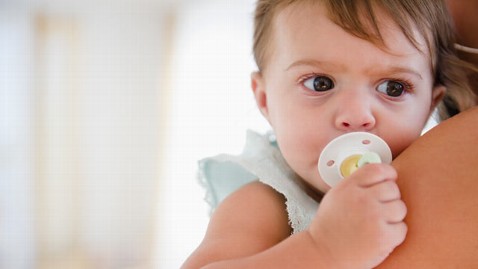Could Sucking Your Baby's Pacifier Cut Allergy Risk?

(Credit: Getty Images)
We've all seen it. A pacifier tumbles out of a crying baby's mouth and hits the floor with a wet thump.
Maybe it bounces once or twice.
Some parents throw it right in the trash. Others boil it. Some just give it a rinse in the sink.
But some moms pick up the pacifier, put it in their mouth and hand it right back to baby, and a new study suggests the practice may be associated with fewer allergies later on.
RELATED: Weird Food Allergy Stresses Moms, Baffles Doctors
"It's really an interesting study, because it supports the theory of the hygiene hypothesis," said Dr. Samuel Friedlander, an allergy specialist at University Hospitals in Cleveland. "It's a theory that states that our world is too clean. The immune system is like an army, and if the army doesn't have anything to fight - like germs - it fights allergens."
Researchers at the Sahlgrenska Academy of Göteborg University in Sweden followed 174 babies and their parents for several years and tested them for allergies, eczema and asthma. They also asked parents how they cleaned off pacifiers, and found that nearly half of them used their mouths on occasion.
By the time babies were 18 months old, those whose parents sucked their pacifiers were less likely to have asthma and eczema, and the researchers concluded that this was because parents exposed their babies to bacteria in their saliva, stimulating babies' immune systems. There was also a trend toward a reduction in allergy signs. But by the time babies reached 36 months old, they only had an added protection against eczema.
RELATED: Immigrant Kids Less Likely To Have Allergies
Friedlander said parents reading about the study should keep in mind that the research doesn't show causation. It only shows association.
Dr. Erick Forno, a pediatrician at the Children's Hospital of Pittsburgh of the University of Pittsburgh Medical Center, said that the study was interesting but said he didn't think parents should start sucking their baby's pacifiers more often. He noted that the study was small, and added that the long-term effects of this bacteria exposure are not clear.
Forno also noted that children may be exposed to the bacteria without their parents sucking on their pacifiers.
"Not only will they kiss kids' mouths, but they'll also share utensils," he said, adding that the pacifier could still have different bacteria because it sits in the mouth for a longer period of time than a spoon.
For some parents, exposing children to bacteria this way might even be detrimental. For instance, parents with herpes or cold sores could pass a virus to their children.
Dr. Jennifer Kim, a pediatric immunologist and allergist at Mount Sinai Hospital in New York, said parents shouldn't change behavior based on this study.
"Generally, what I tell families is don't change what you normally do based on the results of one study," she said.